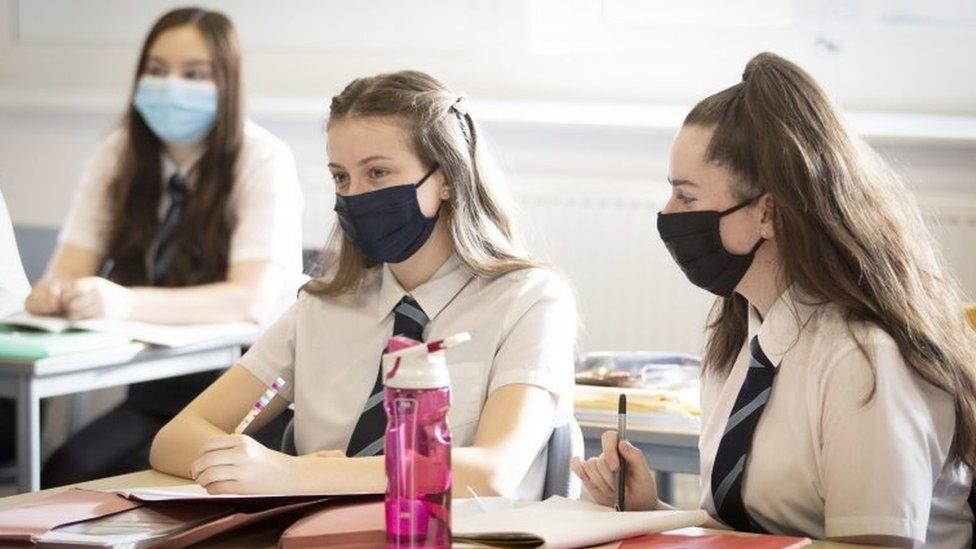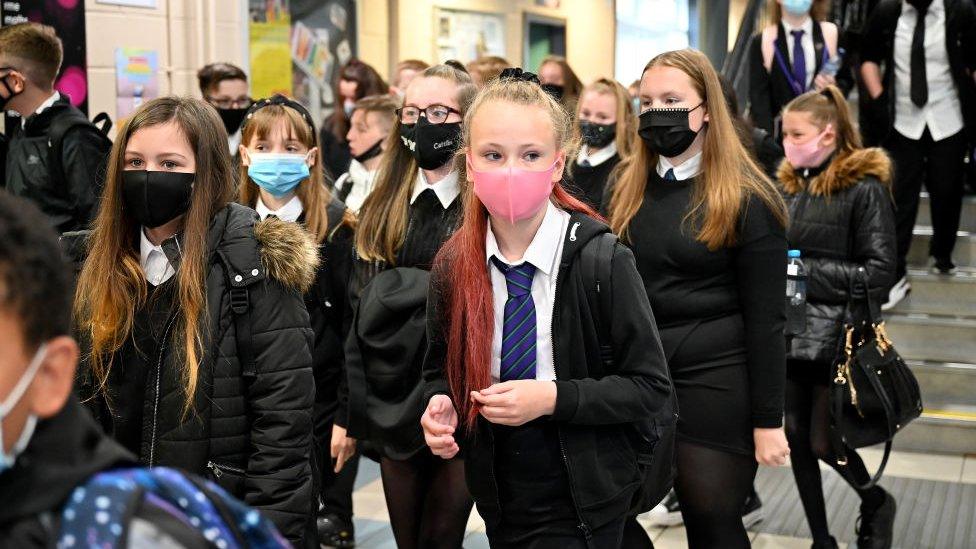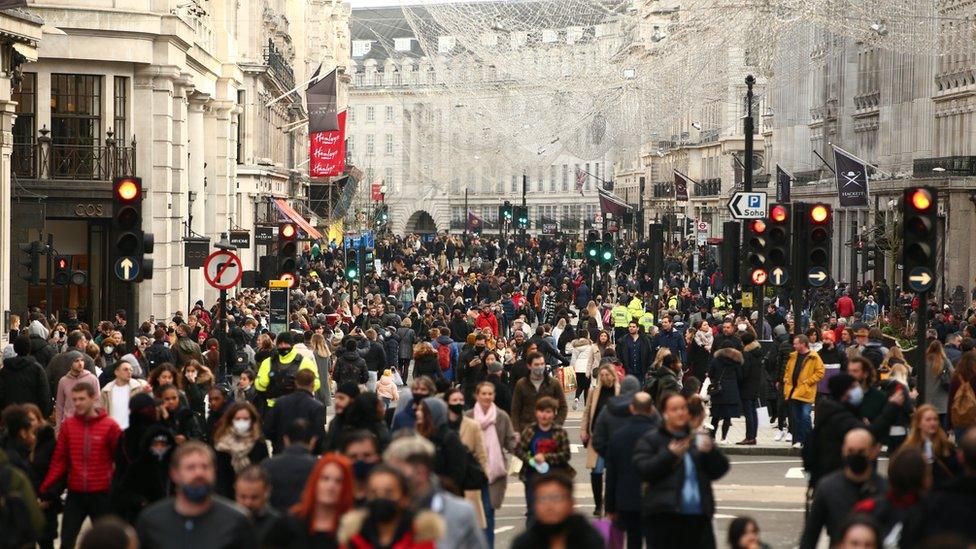Covid-19 tests for secondary school pupils in parts of London, Kent and Essex
- Published

Mass testing will be rolled out to secondary school children in the worst-affected areas of London, Kent and Essex, the health secretary has said.
Matt Hancock said "by far" the fastest rise in coronavirus infection rates in these areas was in 11 to 18-year-olds.
This age group in these areas should be tested regardless of symptoms, he said.
"We need to do everything to stop the spread in school-age children now," Mr Hancock said, adding that more details will be set out on Friday.
It comes after Londoners were urged to "stick by the rules" this week amid fears the capital - in tier two - may be put under tier--three restrictions following a rise in Covid-19 cases.
Meanwhile, all secondary schools and further education colleges in Wales will move classes online from Monday, Welsh education minister Kirsty Williams has announced.
Speaking at a Downing Street press briefing, Mr Hancock said the government was "particularly concerned" about coronavirus cases in parts of London, Kent and Essex, which were rising and were often "already high".
He said the government must not wait until the next review of the tiered restrictions on 16 December but must "take targeted action immediately".
Mr Hancock said "in particular" there was a "very specific rise" among the secondary school age group and specifically in north-east London, while the rate among adults in London was "broadly flat".
He said: "We know from experience that a sharp rise in case in younger people can lead to a rise among more vulnerable age groups later."


East London and the parts of Kent and Essex that border it have become one of the major Covid hotspots in England.
Rates have been rising in recent weeks with some areas seeing well over 300 cases per 100,000 people in the past week. To put that in perspective, it's close to double the rate seen in Manchester which is currently in tier three.
The data shows cases are being driven by young people but the concern is that that will then lead to high rates among older age groups who are susceptible to serious illness.
The government's hope is by flooding the areas with testing they will be able to break the chains of transmission.
But that will be too late in terms of the difficult call that has to be made by Wednesday when the government decides whether areas move up or down in the system of tiers.
Ministers have wanted to treat London as a whole, but with some of the southern boroughs seeing below average rates there is a growing argument the capital should be split when it comes to restrictions.

The mass testing plan will apply in the seven worst-affected boroughs of London, plus parts of Essex that border London and parts of Kent.
Mr Hancock said it was "right" to keep schools open "for education and for public health".
"We are therefore surging mobile testing units and will be working with schools and local authorities to encourage these children and their families to get tested over the coming days," he said.
Mr Hancock said both PCR (a standard coronavirus test) and lateral flow testing - which takes about half an hour to show a result - would be used.

TESTING: How do I get a virus test?
LOOK-UP TOOL: How many cases in your area?
YOUR QUESTIONS: We answer your queries
GLOBAL SPREAD: How many worldwide cases are there?
THE R NUMBER: What it means and why it matters

London and Essex are currently in tier two - the second highest level - meaning there is no household mixing allowed anywhere indoors and the rule of six applies outdoors.
Kent is in tier three, the highest level, in which you can only meet other households in outdoor public spaces such as parks, where the rule of six applies.
Four London boroughs were among the 20 places with the highest case rates in England in the week ending 6 December, according to Public Health England. They are Havering (400.7 cases per 100,000 people), Barking and Dagenham (333.5), Waltham Forest (327.1) and Redbridge (310.3).
Prof Paul Hunter, from the University of East Anglia's school of medicine, told the BBC it "does sadly look like" the capital would be moved into tier three.
Mayor of London Sadiq Khan said on Thursday that London was facing "a tipping point" - but that placing it under tier three restrictions would be "catastrophic".
However, Mr Hancock said he "didn't want to pre-empt" any decision that might be made about moving London and parts of the South East into tier three.
He said it was "not inevitable" that the capital would have to face tighter rules.
Third wave 'not inevitable'
Mr Hancock also told the briefing it was important not to "blow" the progress made so far in controlling coronavirus and urged everyone to "stay on our guard now and through Christmas".
He said tens of thousands of people had been vaccinated with the Pfzier/BioNTech jab in 73 UK hospital hubs.
GP-led sites will begin vaccinations next week, Mr Hancock said, with jabs administered in some care homes by Christmas.
Asked whether people would be able to spend New Year's Eve with their close family members, he said there would be no special set of rules for the occasion.
England's chief medical officer Prof Chris Whitty said a third wave was "not inevitable" but warned people must be "very, very sensible" over Christmas.
"The way we prevent it [a third wave] is everybody, all of us, coming together and deciding we want to try and stick to the guidance that's there," he said.
Last week, Scotland's education secretary said there would be no extension to the nation's school Christmas holidays, despite talks about potentially shutting all schools on 18 December and reopening them again on 11 January.
Meanwhile, Northern Ireland's education minister has repeatedly said there were no plans to close schools early for the Christmas break.
The latest coronavirus daily figures show 20,964 new coronavirus infections have been recorded across the UK, and another 516 people have died within 28 days of a positive test, bringing the total to 63,082.


Related topics
- Published10 December 2020

- Published8 December 2020
